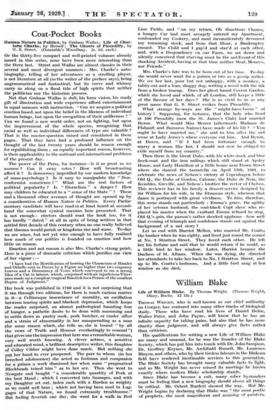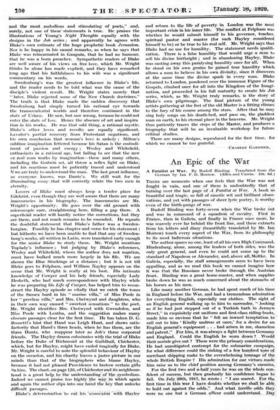William Blake
'roost/vs WRIGHT, who is well known as our chief authority on Cowper, has. ventured into many other tracks of biological study. Those who have read his lives of Daniel Defoe, Walter Pater, and John Payne, will know that he has an infinite capacity for taking pains, but also that he has more charity than judgment, and will always give facts rather than criticism.. . His qualifications for writing a new Life of William Blake are many and unusual, for he was the founder of the Blake Society, which has put him into touch with Dr. John Sampson, Dr, Geoffrey Keynes, Mr. Archibald Russell, Mr. Laurence Binyon, and others, who by their tireless labours in theBleicein field have rendered inestimable services to thiS ,generation. The Blake Society has brought many valuable facts Lo _light, and as Mr. Wright has never missed its meetings he kadivs exactly where modern Blake scholarship stands.
Since Blake has become a pull, many sober bystanders mast be feeling that a new biography should above oll. things be critical. Mr. Osbert Burdett showed the way. Bid. Mr. Wright begins by declaring that Blake was the most poetic of prophets, the most magnificent and amazing of painteis.
and the most melodious and stimulating of poets," .and, surely, not one of these' statements is true. He praises the illustrations of Young's Night Thoughts equally with the designs in the Job series ; and apparently he agrees with Blake's own estimate of the huge prophetic book Jerusalem.
or is he happy in -his casual remarks, as when he says that Blake was reincarnated in Gauguin, that he had no humour, that he was a born preacher. Sympathetic readers of Blake are well aware ,of his views on free love, which Mr. Wright thinks he alone has made explicit,- and they have remarked long. ago that his faithfulness to his wife was a significant commentary on his words. •
Swedenborg's was the greatest influence in Blake's life, and the reader needs to be told what was the cause of the disciple's violent revolt. • Mr. Wright states merely. that " later, Blake rejected some of the New Church doctrines." The truth is that Blake made the sudden discovery that Swedenborg had simply turned his rational eye towards the transcendental worlds and therefore continued in the state .of Urizen. He saw, but saw wrong, because he could not enter the state of Los. Hence the absence of art and inspira titan in his works. He was that odd thing, a rational mystic. Blake's other loves and revolts are equally significant. Lavatees partial recovery. from Protestant negations, and his own conclusion that woman's love is • unholy ; Milton's sublime imagination fettered because his Satan is the embodi- ment of passion and energy ; Wesley and • Whitefield, enthusiasts in a rational age, but failing to see that the new or. Neal man works by imagination—these and many others, including the Godwin set, all throw a reflex light on Blake, and his reactions must be patiently traced and understood if we are truly to understand the man. The last great influence, as everyone knows, was Dante's. We still wait for the illuminating essay that will correctly relate the two men in eternity.
Lovers of Blake must always keep a tender place for Gilchrist, even though they are well aware that there are many inaccuracies in his biography. The inaccuracies are Mr. Wright's opportunity; He goes over the old ground with microscopic care, straightening-here, filling a gap there. A superficial reader will hardly notice the corrections, but they are there, and not much remains to be emended. He repeats the doubtful statement that Blake's father was a Sweden. borgian. Possibly he has chapter and verse for his statement ; but hitherto we have been unable to find that any of Sweden- borg's works, all written in Latin, were translated early enough for the senior Blake to study them. Mr. Wright mentions Teplady's influence ;• but judging by Blake's references, Wesley and Whitefield, whom the author does not mention, must have bulked much more largely in his iife. We are shown the Blue Stockings at a distance ; but it is not till Blake goes to Felpham, and William 1Xayley appears on the scene that Mr. Wright is really at his bast. His intimate knowledge of Cowper and his lady friends, especially Lady Hesketh, who had much correspondence with Hayley while he was preparing his Life of Cotopet,- has helped him to recon- struct the Hayley episode so vitally that we catch the tones of the Sussex bard in his " marine villa," of Miss Poole in her " peerless villa," and Mrs. Chetwynd and daughters, who in their own way caused " sweetest 'sensations " to the poet. Mr. Wright identifies Mrs. Chetwynd with Gwendolen, and Miss Poole with Leutha, and the suggestion makes many obscure passages clear for the first time. He has taken D. G. Rossetti's hint that, Hand was Leigh Hunt, and shows satis- factorily that Hand's three heada, When he has them, are the three Hunts, who . reappear later as Job's three corporeal friends. The Hayley drama culminates with the trial of Blake before the Duke of Richmond at the Guildhall, Chichester, which, but for Hayley, might have ended tragically for Blake. Mr. Wright is careful to note the splendid behaviour of Hayley on the occasion, and his charity leaves a juster picture in our minds than that of the biographers who blame Hayley, because it had not pleased PrOvidence to bestow certain gifts on him. The chart, on page 153, of Chichester and its neighbour- hood is a great help_to the tuiderstanding--of tile: symbolism. Indeed we cannot praise too highly -the way in Which again and again the author slips into our hand tfie key that unlocks difficult passages.
Blake's determination -lo with Hayley
and return to the life of poverty in London was the most important crisis in his inner life. The conflict at Felpham was whether he would submit himself to his governor, teacher, spiritual pastor and master (for such Hayley considered himself to be) or be true to his real self. Mr. Wright says that Blake had no use for humility. The statement needs qualifi- cation. There is a false humility that would urge a man to sell his divine birthright ; and in abandoning Hayley, Blake was casting away this paralysing humility once for all. When he stood on his own genius he gained true humility which allows a man to believe in his own divinity; since it discovers at the same time the divine spark in every man. Blake returned to London, pondered over the immense Figure of the Gospels, climbed once for all into the Kingdom of the Imagi- nation, and proceeded in his full maturity to create his Job series, which, as Mr. Wright truly remarks, is the story of Blake's own pilgrimage. The final picture of the young artists gathering at the feet of the old Master is a fitting climax to the fury of his course among the stars. After that he may sing holy songs on his death-bed, and pass on, the gladdest man on earth, to-his eternal place in the heavens. Mr. Wright thus patiently traces the steps of the Master, and produces a biography that will be an invaluable workshop for future critical studies.
There are many designs, reproduced for the-first time, -for
which we cannot be too grateful. - - - -CHARLES GARDNER.









































 Previous page
Previous page